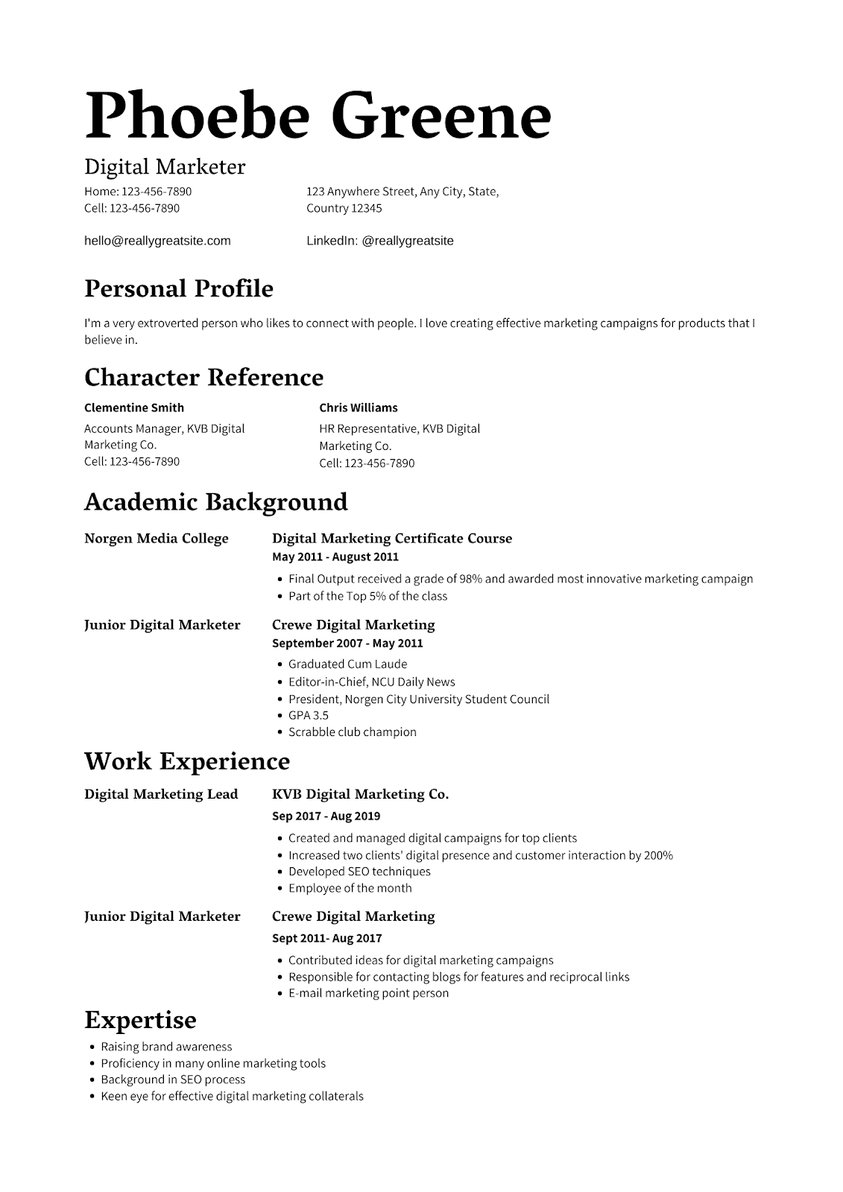3 Steps to Building the Creative Project Dream Team
It’s go time! Your strategy’s been approved, your project’s been greenlit, now you’re ready to...

 Recruiters and hiring managers get tons of job application emails a day. With this, job candidates face the most challenging task: to catch their attention despite the competition.
Recruiters and hiring managers get tons of job application emails a day. With this, job candidates face the most challenging task: to catch their attention despite the competition.
The average attention span of humans in today's technological era is eight seconds. Within that short period, you need to capture a hiring manager's attention. And the surefire way to do that is if you know how to craft a winning resume.
There are no magic spells responsible for making the best resumes that can catch the attention of hiring managers, but there are rules you can follow to make it more likely to happen. Before knowing our tips, guides, and tricks, let's look at a sample resume first.

So what’s wrong with this resume? The design is simple but uninspired, there is improper sectioning throughout, and there are career details that don’t seem relevant.
Let’s break down what you should do to make this resume worthy of the recruiter’s attention, section by section.
.png?width=1414&name=Resume%20Blog%20(2).png)
There are three types of resume formats — chronological, functional, and combination. It would help if you chose the arrangement that is best suited to your career experience. But the thing to keep in mind for a perfect resume is this: it must take the recruiter's attention from the get-go.
So, start with the things that you think they need to know first. For this particular resume, we would recommend starting with the work experience section, followed by the academic background, then the expertise, and finally with the character reference.
Speaking of rearranging, move your career experience according to importance. The surest way to give them a glimpse of your professionalism is by highlighting the experiences that matter.
In this resume's example, it's the Employee of the Month. Move this detail to the top of your work history, so it gets noticed easily.
.png?width=586&name=Resume%20Blog%20(3).png)
.png?width=312&name=Resume%20Blog%20(4).png)
The easiest way to bore recruiters is by listing things they are not interested in. They don't care if you won the scrabble competition in college, so scratch it off your educational background. Focus only on the career experiences that are relevant to the job description.
Now that we've covered that part, let's delve into the most exciting bit: crafting the perfect resume! Delve into our tips, guides, and tricks to truly stand out as a job applicant.
We hate to admit it, but looks do matter — at least in a resume's case. It's the first thing employers see, so take your time choosing the right design.
The vibrant colors you use or the stylish accent frills are all things that can attract the hiring manager's attention. If you find black and white elements elegant, don't be afraid to use them and express your own creativity. Play around with monochromes, use a readable font, and include details that add flair to the design.
A career summary is a brief, general statement of your most vital skills and accomplishments. Use these two sentences as your chance to toot your own horn.
.png?width=571&name=Resume%20Blog%20(5).png)
The main reason why the example above will not be as effective as you hope it to be is that it is not compelling. An excellent career summary has the power to open doors. So make sure that yours lets you get in the room. Take this revised professional summary as your cue:
.png?width=568&name=Resume%20Blog%20(6).png)
See how much better that is? It's clear, concise, and instantly lets people know who you are and what you bring to the table.
If you're using the functional resume format, you can skip this bit. But, if you are following the chronological format, adding your career history, educational background, and professional skills is significant. Put them in reverse-chronological order. Thus, arrange them from the latest to the oldest, being careful to select only the most relevant details.
Besides detailing your experiences and skills, character references also show your professional assets and attest to your character and interpersonal qualities. This is why it is vital to keep a positive relationship with the professionals within or outside your field. They will confirm your exceptional abilities and work ethic to potential employers.
Including your hobbies gives the recruiter a peek of your life when you take off your professional jacket. Hobbies are great conversation starters, and they also let recruiters know that you have soft skills outside the professional skills you use in your industry.
Remember when we told you how everyone's attention span is eight seconds? This knowledge will come in handy when keeping your resumes to one page. With every second that passes, a hiring manager's attention span decreases looking at your resume. That's why you need to keep your entire resume brief.
Unless you are applying to be a partner or executive in the company, one page will be sufficient. In fact, it's such a popular best practice that even career veterans with 30+ years of experience try to keep themselves to one page. To keep it clear and concise, retain only the skills and experiences relevant to the job at hand.
Companies today use the Applicant Tracking System (ATS) to streamline their hiring process. When making your resume, make sure that the phrases you choose meet the standard terms in the industry you’re applying for.
Pro tip: Take inspiration from the keywords that the company used on their job listing.
There's no reason to be embarrassed about failing to get a job interview. Well, not unless the only reason you failed is that you had way too many spelling and grammar errors in your resume.
To avoid making this significant but avoidable mistake, use writing assistance tools available on the internet like Grammarly, or have your dictionaries ready.
With the tips at hand, we redesigned the resume above and turned it into this:
.png?width=1131&name=Resume%20Blog%20(7).png)
In hindsight, crafting the perfect resume is not as complicated as we thought it would be. It just takes a hefty amount of honesty, a dash of personal touch, and a good eye for detail to make it work. Good luck with job hunting!
About the Author: Moira Perez is a writer, traveler, and content specialist in ResumeGuy. She's passionate about marketing and public relations and can be reached on LinkedIn!

It’s go time! Your strategy’s been approved, your project’s been greenlit, now you’re ready to...
July 17, 2019

The world of clinical research is changing fast, and the skills needed to succeed in 2025 will be a...
December 17, 2024

For most of us the holidays are a time of joy and maybe even some rest, but what if you have to...
December 13, 2019